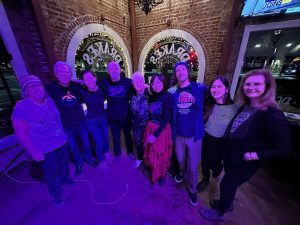Authors Kimberly Layne, Twiana Armstrong and I discuss the implications of AI creativity tools and how we have started to used them.
Here are the links that Twiana mentions in the talk:
https://thehill.com/policy/technology/3905672-chatgpt-sends-shockwaves-across-college-campuses/
Find Kimberly and Twiana here:
Kimberly Layne: https://www.kimberly-layne.com/
Twiana Armstrong: https://linkedin.com/in/twianaarmstrong
[Video Transcript]
[Twiana Armstrong]
Leaders, in the Roaring ‘20s, the radio totally changed the world’s communication infrastructure. In our Roaring 2020’s, OpenAI is the newest provocateur that commands the world’s s attention. Many sectors are embarking into new territory as OpenAI technology takes on the world. Artificial Intelligence allows you to create content within seconds. Write that best seller in minutes, debut your artistic talents, build that strategic operating plan in a matter of hours just before presenting to stakeholders, or stayed up all night partying, no problem, knock out that thesis just in time to meet the deadline. ChatGPT, Google’s Bard, YouChat, JasperChat and other platforms allow you to produce these and more for free. Yes, we can produce content that achieves all of the above – at what cost? Sarah Eaton, an Associate Professor of Education at the University of Calgary who studies AI states “I think this is the greatest creative disruptor to education and instruction in a generation.” Implications and challenges to academic honesty, artistic proprietary rights and business integrity are conversations taking place around the proverbial conference room table. What does this mean to your ability to lead? What guardrails and safety nets are in place that effectively curtail those in your industry who will abuse the platforms for nefarious gains? Per Chief Scientist Ilya Sutskever at The Verge, “Society, I think, has a limited amount of time to figure out how to react to that, how to regulate that, how to handle it.” Leaders, please share your thoughts, how are you addressing OpenAI platforms? Click on the links below as you join the conversation. Kimberly, what is your point of view about this new territory?
[Kimberly Layne]
I feel you Twiana. I question if Ai and Chat GBT and the likes are replacing our ability to think on our own and come up with creative ideas and content?
Our 14-year-old presented his homework at the dinner table last week. He had to come up with a question that included diversity and had a causal relationship to the culture within Africa. WHAT??
After several discussions around education, income, nationality, language, we were stumped. Then my fiance mentioned, let’s ask ChatGBT. So we collectively came up with the question does the number of spoken languages within a country affect the education rates.
Chat GBT spit out volumes and percentages for African countries in rapid succession giving us what we were looking for and validating our hypothesis.
What could have taken hours of research took us 5 minutes and prevented us from sitting at the dinner table for another 2 hours. Whew! the information we gained was valuable for our son to begin his assignment. Not write it all together.
I think that is where we miss the mark on AI. We may assume it is the end all be all, replacing the human component. When in reality, we need to embrace it as a tool by asking it good questions, give it good tasks, validate the information , and most importantly make it our own.
Just as we were all stumped on where to begin with our son’s homework assignment, CHAT GBT gave us a head start on putting something down on paper, very often the hardest part of starting anything. Now we have a tool that helps us perform the first draft of our content we are trying to create, just make sure that you put your own thumb print on it to ensure its credibility and relatability.
Matt how are you embracing this tool or not?
[Matt Schlegel]
It’s going to be fascinating to see where AI takes the creative process. I’ve already started using it in a number of different ways, mostly just playing around with it at this point. For instance, I was with some friends, and we were talking about an interesting situation. So I just asked ChatGPT to write a song about that situation. And it wrote a song. And then we asked it for chords, it gave us some chords.
And then we asked it, “Well, are there other options for chord progressions?” And then it listed many other options and said, “Well, if you want it to feel more like this or feel more like that.” And then it gave us all these different chord progressions based on the mood of the song we were trying to create. It was fascinating how much we were able to create in just a very short amount of time.
Another way that I used AI the other day was I was creating a PowerPoint presentation, and I wanted a specific image to illustrate a certain point.
After searching and not finding an image that worked, I used an AI tool and had it create an image. It just took a couple of minutes, and I had the picture that I needed for my presentation.
I think we’re just at the beginning of learning how AI can enhance the creative process. I’m only just beginning to understand how I can use it and how it can help me. And yes, I am even thinking about having it generate a first draft of some marketing material I need.
Leaders, how are you and your teams using these new AI tools to better communicate your messages in our Roaring 2020s. If you haven’t already, check out the links in the comments to start familiarizing yourself with these new tools.
#leadership #AI #creativity #ChatGPT #Roaring20s #Roaring2020s

